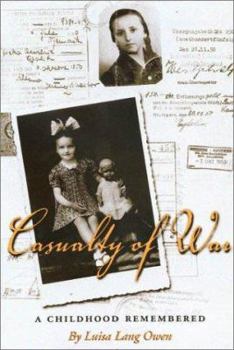Casualty of War: A Childhood Remembered
(Part of the Eugenia & Hugh M. Stewart '26 Series Series)
Not all casualties of war die on the battlefield. In the wake of World War II, Yugoslavia purged its territory of the ethnic Germans who had formed a part of its human mosaic. Tarred with their ethnic origins and the conscription of their fighting-age men into the Waffen SS, the Volksdeutsche, as these settlers were called, were rounded up at the war's end and herded into concentration camps. Those who were not murdered or did not die from the harsh conditions were expelled from the village homes their families had known and loved for three hundred years. Nine years old when she entered the concentration camp in 1945, author Luisa Lang Owen survived the persecution of the Danube Swabians, eventually finding herself in America, where she made a new life for herself, a life that nonetheless held within it the memories and lessons of the atrocities she had experienced in her homeland. Like thousands of other Germans in the Danube Valley at the end of the war, Luisa and her family were chased from their home, lodged in a sheep stall, and resettled in camps with other Germans from her village. Shorn of their possessions, given little food or fuel, pressed into hard labor, beaten by guards, and separated from their families, many despaired and many died. Luisa barely survived as others succumbed to malnutrition, disease, and exposure. Her haunting memoir provides a window into the ethnic cleansing that preceded the recent exterminations in Bosnia and Kosovo by fifty years--an episode of horrors that has not appeared as even a footnote in descriptions of the more recent atrocities practiced in that region. Her testament, as a casualty of war, bears historic witness and gives insight into the personal experiences of ethnic cleansing. It stands as witness to a massive crime that has been conveniently forgotten, a corrective to a bit of neglect that did away with its victims as a people, and a personal depiction of what ethnic cleansing is really about. "The problem was not just that they did not want us to have or to be," Luisa Lang Owen writes, "they wanted us not to have been."
Format:Hardcover
Language:English
ISBN:1585442127
ISBN13:9781585442126
Release Date:November 2002
Publisher:Texas A&M University Press
Length:328 Pages
Weight:1.62 lbs.
Dimensions:1.2" x 7.0" x 9.0"
Related Subjects
HistoryCustomer Reviews
3 ratings
History from another perspective
Published by Thriftbooks.com User , 16 years ago
I read this book looking for answers. I grew up listening to stories that were almost identical to this book. I didn't understand why my mother was in a labor camp as a child after the war. Her family has made the same mistake of not leaving in time. The war was over and they niavely believed life would return to normal. It is good to know that someone has told the story.
What the world wanted to deny that it happened!
Published by Thriftbooks.com User , 21 years ago
This book should be read by all Danube Swabians and their offsprings as well as all freedom-loving, truth seeking and fair minded people of this world.
Being Distilled
Published by Thriftbooks.com User , 22 years ago
Luisa Lang Owen's recounting of her childhood and the losses she and others experienced before, during and after the war, including three years in a concentration camp is, at once, both hauntingly beautiful and horrific. Her captors, in seeking to exterminate individuals and their culture ironically distilled, in this young woman, the essence of being. Her lush and loving attention to detail, her artistic perceptions were heightened and strengthened in those years, and what we sometimes refer to as the "strength of the human spirit" is clearly defined in the telling of this woman's coming of age under life-threatening conditions. Both fascinated and saddened by the telling, I felt as if I'd entered the spirit of someone who has always lived and continues to live fully and attentively in the world.






